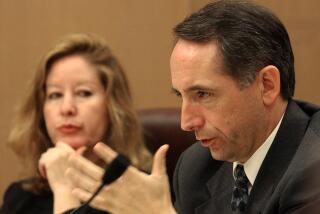No Decision on HP Chairwoman’s Fate
- Share via
SAN FRANCISCO — Hewlett-Packard Co.’s board of directors adjourned an emergency phone conference Sunday without announcing a decision on the fate of Chairwoman Patricia C. Dunn.
Dunn is facing calls to resign or be fired for her role in an internal investigation that may have used illegal means to spy on colleagues and journalists.
The board was scheduled to meet again this afternoon, according to HP, a major maker of computers and printers.
Dunn, a former freelance journalist who has become one of the most powerful women in corporate America, had ordered the outside investigation of fellow board members to determine who anonymously leaked confidential company information to journalists, especially as it related to the job status of former Chief Executive Carly Fiorina.
As part of their surveillance, the investigators used Social Security numbers and other personal information to impersonate HP directors and journalists. The impostors tricked AT&T; and other phone companies into turning over detailed logs of home and cellular phone calls.
Although a common tactic among private investigators, the subterfuge -- known as “pretexting” -- tests the bounds of California law. The state attorney general has launched a criminal investigation.
Board member George A. Keyworth II was identified as the source of the leak, and HP responded by barring him from seeking reelection.
Another HP director, Silicon Valley venture capitalist Thomas J. Perkins, resigned from the board in May in protest of the investigators’ tactics.
Perkins’ departure triggered a chain of events that forced HP to publicly disclose its role in the pretexting. Over the weekend, Perkins called on Dunn to resign.
“I acted not from any ill will toward Ms. Dunn but to protect the best interests of HP,” Perkins said in a statement. “I think the past months and days have shown that those interests are best served if Ms. Dunn would resign from the board.”
Dunn told the Associated Press last week she would resign if asked but said several fellow board members had urged her to remain on the job despite the criminal investigation.
“I serve at the pleasure of the board,” she told the AP on Friday. “I totally trust their judgment. If they think it would be better for me to step aside, I would do that. But a number of directors have urged me to hang in there.”
Dunn apologized for the invasion but insisted that the problem began with Keyworth’s leaks and Perkins’ angry resignation. She said she had distanced herself from the attorneys and investigators who conducted the investigation.
In August, Perkins’ attorney Viet Dinh asked the Securities and Exchange Commission to require HP to submit details of Perkins’ resignation, which HP filed Wednesday.
The company revealed that lawyers hired to review its tactics could not determine whether the investigation “complied in all respects with applicable law.”
An investigation by California Atty. Gen. Bill Lockyer found that the tactics broke state laws related to identity theft and illegal access to computer records.
Lockyer said he was still digging to determine the breadth of the violations but added that Dunn, HP’s attorneys, the investigators and others could face criminal charges.
HP could also be civilly charged and fined.
Dunn told the AP that the media leaks were an “egregious breach” of the company’s standards and that the board of directors fully backed an investigation to root out the source.
“This was not my spy campaign on our board,” she said.
Dunn said she had no clue that investigators would resort to pretexting and she didn’t even know what the word meant until June or July. She also said she was “appalled” that journalists had been targeted.
Experts say the fall of Enron Corp. and other recent scandals has made boards far more important in the governance of U.S. companies. They say HP’s fight could be the first of many public disputes among board members.
“The paradigm has shifted in the direction of the board as being at the top of the corporate governance pyramid,” said Patrick McGurn, executive vice president and special counsel at Institutional Shareholder Services.
“With that pressure, there’s going to be greater opportunities for disagreement in the boardroom.”






